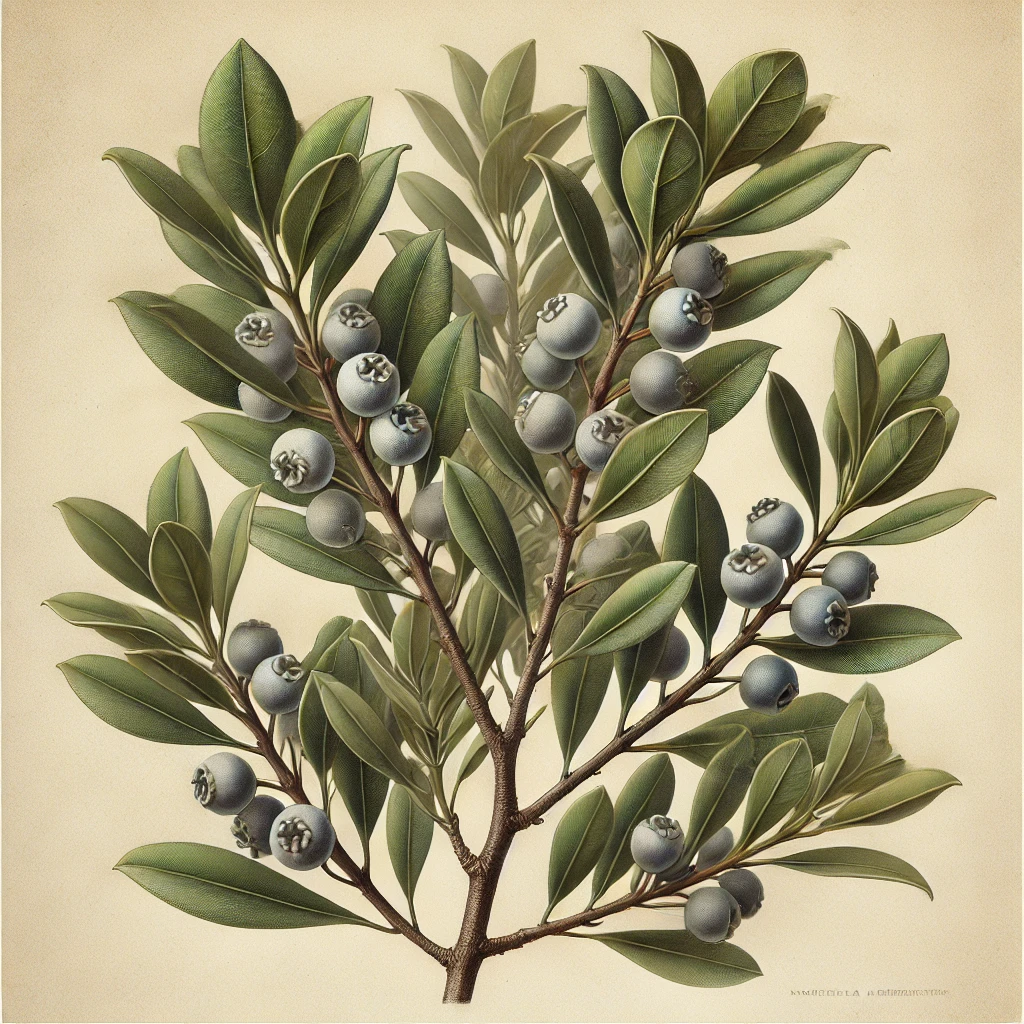Bayberry (Morella cerifera): A Traditional Herbal Remedy for Inflammation and Respiratory Health

Overview
Bayberry (Morella cerifera), also known as Wax Myrtle, is a shrub valued in traditional medicine for its anti-inflammatory, astringent, and expectorant properties. The bark, leaves, and berries have been used to support respiratory health, treat digestive ailments, and address skin issues. While beneficial for colds, sore throats, and other common ailments, bayberry must be used cautiously due to the tannins and phenolic compounds in its bark, which have shown mixed effects in laboratory studies.
Medicinal Activity
Bayberry provides several medicinal benefits, including:
Astringent: Helps tighten tissues, making it useful for wounds and sore throats.
Anti-inflammatory: Reduces inflammation, beneficial for conditions like arthritis.
Expectorant: Clears mucus, aiding in respiratory conditions.
Diaphoretic: Promotes sweating, assisting in fever reduction.
Antibacterial and Antiviral: Provides support against infections.
Astringent: Helps tighten tissues, making it useful for wounds and sore throats.
Anti-inflammatory: Reduces inflammation, beneficial for conditions like arthritis.
Expectorant: Clears mucus, aiding in respiratory conditions.
Diaphoretic: Promotes sweating, assisting in fever reduction.
Antibacterial and Antiviral: Provides support against infections.
Therapeutic Indication
Bayberry has traditionally been used for various health conditions, including:
Respiratory Health: Used to relieve symptoms of colds, flu, sore throat, and bronchitis.
Digestive Support: Aids in managing diarrhea and dysentery due to its astringent properties.
Skin and Wound Care: Topically applied for boils, ulcers, and other skin conditions.
Circulatory Health: Believed to support blood circulation and heart health.
Respiratory Health: Used to relieve symptoms of colds, flu, sore throat, and bronchitis.
Digestive Support: Aids in managing diarrhea and dysentery due to its astringent properties.
Skin and Wound Care: Topically applied for boils, ulcers, and other skin conditions.
Circulatory Health: Believed to support blood circulation and heart health.
Prepration & Usage
Bayberry is prepared in different forms for both internal and external applications:
Tea or Infusion:
Dosage: 0.6–2 grams of powdered bark infused in hot water, taken 2–3 times daily to support digestive and respiratory health.
Tincture:
Dosage: 0.6–2 ml of a 1:1 tincture in 45% ethanol, taken 2–3 times daily.
Topical Application:
Preparation: Paste or poultice from powdered bark or leaves can be applied to skin irritations, sores, and wounds.
Tea or Infusion:
Dosage: 0.6–2 grams of powdered bark infused in hot water, taken 2–3 times daily to support digestive and respiratory health.
Tincture:
Dosage: 0.6–2 ml of a 1:1 tincture in 45% ethanol, taken 2–3 times daily.
Topical Application:
Preparation: Paste or poultice from powdered bark or leaves can be applied to skin irritations, sores, and wounds.
Safety & Considerations
Bayberry’s beneficial effects come with specific cautions:
Carcinogenic Potential: The tannins in bayberry have shown carcinogenic effects in some laboratory studies; limit use if there is a personal or family history of cancer.
Pregnancy and Nursing: Avoid use during pregnancy and breastfeeding due to potential mineral corticoid effects and tannin content.
High Blood Pressure and Kidney Health: Not recommended for individuals with high blood pressure, kidney issues, or conditions affected by sodium and potassium balance.
Carcinogenic Potential: The tannins in bayberry have shown carcinogenic effects in some laboratory studies; limit use if there is a personal or family history of cancer.
Pregnancy and Nursing: Avoid use during pregnancy and breastfeeding due to potential mineral corticoid effects and tannin content.
High Blood Pressure and Kidney Health: Not recommended for individuals with high blood pressure, kidney issues, or conditions affected by sodium and potassium balance.
Conclusion
Bayberry is a potent herbal remedy used traditionally for respiratory, digestive, and skin health. Its astringent and antibacterial properties make it effective in managing infections and inflammation. However, caution is advised due to the potential carcinogenic effects of its tannins, and its use should be limited, particularly for individuals with preexisting health conditions. When used appropriately, bayberry offers valuable support for various common ailments, particularly those involving inflammation and respiratory congestion.
